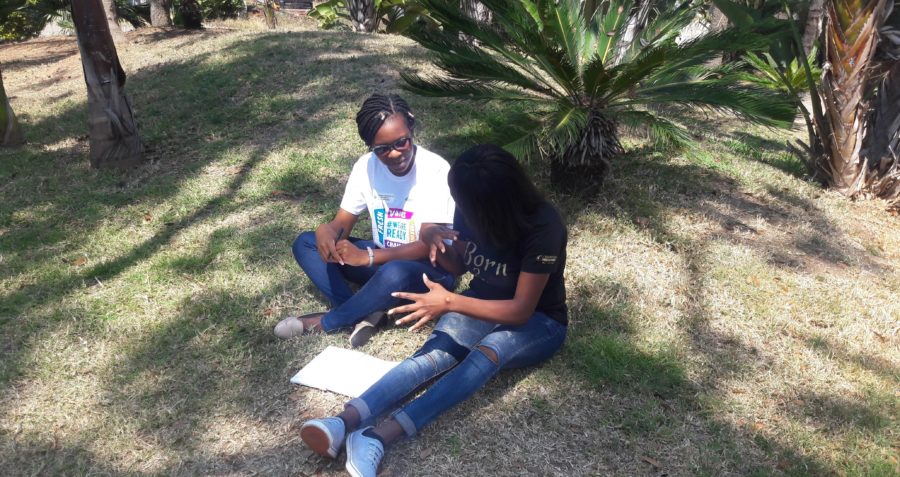READY to Lead: 5 questions for International Day of the Girl
 © Lawrence Phiri
© Lawrence Phiri
More than 90% of adolescent girls that enter the workforce in the next decade in developing countries will work in the informal sector, where low or no pay, abuse and exploitation are common. This vicious cycle traps adolescent girls and young women in poverty and leaves them vulnerable to HIV.
As the world marks International Day of the Girl under the theme With Her: A Skilled GirlForce, we speak to mentor Audrey Nosenga from Zimbabwe Young Positives (ZY+) on the transformative power of peer support.
When an adolescent girl finds out she is HIV positive, the chance she will blame and stigmatise herself are high. How can this be avoided?
If you get comprehensive psychosocial support at all levels, and you understand your status yourself, you will be able to move on from that state of mind of being a victim, of being someone with a loss of self-esteem. Once we do away with that shell then we are able to move on to how you, as an individual, can be empowered with the right information to make good decisions about your future.
We can also make you realise that HIV is part of you, but not the sum of everything that is about you; you still have a life. Giving that hope is the most important step. As long as someone has that hope they will be able to reach out for anything they want.
Give us an example of the sort of issues HIV positive adolescent girls and young women face when trying to find work and how you support them.
In Zimbabwe most young women do domestic work at home, and some decide to do it professionally, as cooks and chefs. But if you are HIV positive you will be told you cannot serve food because of company policies that don’t allow people with contagious diseases to work – even though HIV cannot be passed in this way. This is the kind of thing we face.
Because many young women don’t really have the capacity to provide for themselves and their families, they tend to turn to other things, which exposes them to re-infection and puts other people at risk. They end up in a situation where they don’t think about the future, they just think one day at a time.
At ZYP+ we look at how an individual can be empowered with the right information to make good decisions about their future. We can help to empower them into seeking rightful services when and how they need them. If you want to access education we can link you to an organisation that specifically deals with people who are living with HIV and channel them to school for example.
Resilience plays a part. I know whether the community doesn’t accept me or has judged me or anything, I won’t be moved, I’ll just stand by what I believe.
There is a strong link between HIV and gender based violence. What can be done to break the cycle?
It is a huge challenge, especially when it comes to being HIV positive as an adolescent girl. In Zimbabwe, it is much more painful than being an HIV positive boy, because in the relationship he has the upper hand. Many girls will settle for abusive relationships because they feel it is their chance of happiness. They just do what the guy wants because they think nobody will love them the way they are.
If we want to defeat this we need to include men. It’s possible that they can become champions and influence other men. It’s all about creating a generation of men that support women.
Why did you become a peer mentor?
I realised that many young women living with HIV didn’t really have a place to air out their issues – other people often talk for them. We have been sidelined in a lot of developmental work, especially in sexual and reproductive health.
Personally, I felt empowered by being involved in a lot of meetings where I was educated on current developments and sexual and reproductive health initiatives. When I’m empowered, I’m empowered to mentor another person. It’s all about how this trickles down to the grassroots. When you have a generation of girls who have been empowered then a lot can be achieved.
What have been your proudest moments as a mentor?
I’ve had young women turn to me in times when they need my help because they are being abused. I’ve been able to link them to other girls who have been able to overcome abusive relationships. Most of the things that I talk about, most of the things that I share, they go back to their communities and share with their friends. Now that’s something. Everybody I’ve talked to now knows about relationship abuse and many now say “I cannot settle for this”. Some have even gone back to school. I didn’t know that I would be able to influence people in this way.
Zimbabwe Young Positives (ZY+) is part of Frontline AIDS’ READY to Lead project, which focuses on the power of girls and young women in Zimbabwe to instigate change in policies that impact their health.
This article was written as the International HIV/AIDS Alliance, before we changed our name to Frontline AIDS.
Tags
Ready to LeadYoung peopleZimbabwe


